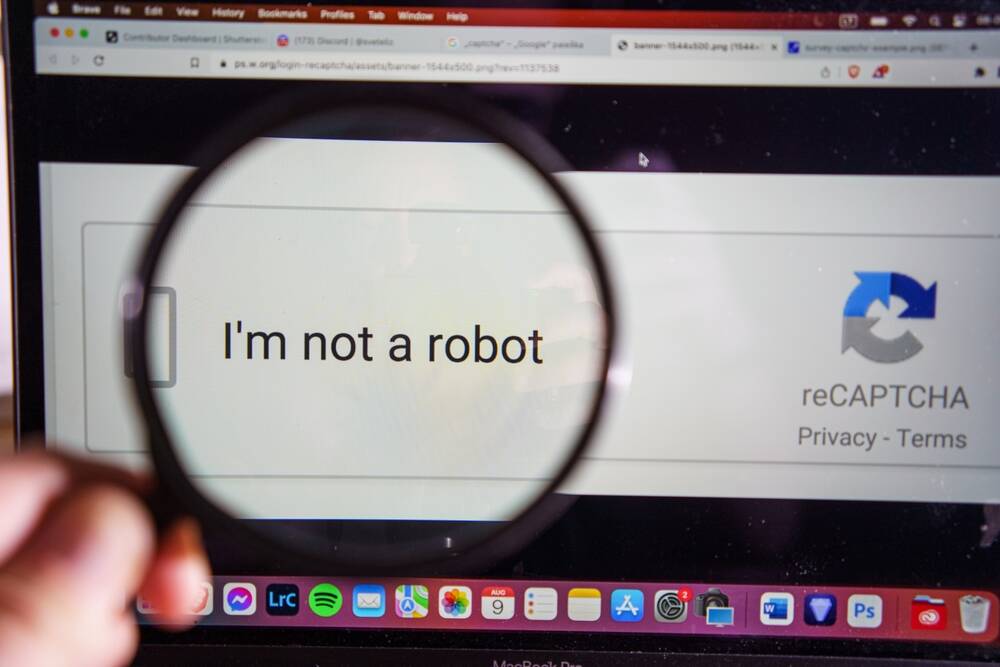- cross-posted to:
- technology@beehaw.org
- cross-posted to:
- technology@beehaw.org
Research Findings:
- reCAPTCHA v2 is not effective in preventing bots and fraud, despite its intended purpose
- reCAPTCHA v2 can be defeated by bots 70-100% of the time
- reCAPTCHA v3, the latest version, is also vulnerable to attacks and has been beaten 97% of the time
- reCAPTCHA interactions impose a significant cost on users, with an estimated 819 million hours of human time spent on reCAPTCHA over 13 years, which corresponds to at least $6.1 billion USD in wages
- Google has potentially profited $888 billion from cookies [created by reCAPTCHA sessions] and $8.75–32.3 billion per each sale of their total labeled data set
- Google should bear the cost of detecting bots, rather than shifting it to users
“The conclusion can be extended that the true purpose of reCAPTCHA v2 is a free image-labeling labor and tracking cookie farm for advertising and data profit masquerading as a security service,” the paper declares.
In a statement provided to The Register after this story was filed, a Google spokesperson said: “reCAPTCHA user data is not used for any other purpose than to improve the reCAPTCHA service, which the terms of service make clear. Further, a majority of our user base have moved to reCAPTCHA v3, which improves fraud detection with invisible scoring. Even if a site were still on the previous generation of the product, reCAPTCHA v2 visual challenge images are all pre-labeled and user input plays no role in image labeling.”
The objective of reCAPTCHA (or any captcha) isn’t to detect bots. It is more of stopping automated requests and rate limiting. The captcha is ‘defeated’ if the time complexity to solve it, whether human or bot, is less than what expected. Now humans are very slow, hence they can’t beat them anyway.
I thought captcha’s worked in a way where they provided some known good examples, some known bad examples, and a few examples which aren’t certain yet. Then the model is trained depending on whether the user selects the uncertain examples.
Also it’s very evident what’s being trained. First it was obscured words for OCR, then Google Maps screenshots for detecting things, now you see them with clearly machine-generated images.
[…] reCAPTCHA […] isn’t to detect bots. It is more of stopping automated requests […]
which is bots. bots do automated requests and every automated request doer can also be called a bot (i.e. web crawlers are called bots too and -if kind- also respect robots.txt which has “bots” in its name for this very reason and bots is the shortcut for robots) use of different words does not change reality behind it, but may add a fact of someone trying something on the other.
There isn’t a good way to classify human users with scripts without adding too much friction to normal use. Also bots are sometimes welcome amd useful, it’s a problem when someone tries to mine data in large volume or effectively DoS the server.
Forget bots, there exist centers in India and other countries where you can employ humans to do ‘automated things’ (youtube like count, watch hour for example) at the same expense of bots. There are similar CAPTCHA services too. Good luck with those :)
Only rate limiting is the effective option.
Only rate limiting is the effective option.
i doubt that. you could maybe ratelimit per IP and the abusers will change their IP whenever needed. if you ratelimit the whole service over all users in the world, then your service dies as quickly into uselessness as effective your ratelimiter is. if you ratelimit actions of logged in users, then your ratelimiting is limited by your ability to identify fake or duplicate accounts, where captchas are not helpful at all.
at the same expense of bots. they might be cheap, but i doubt that anyway, bots don’t need sleep.
i was answering about that wording (that captchas were “not” about bots but about “stopping automated requests”) and that automated requests “are” bots instead.
call centers are neither bots nor automated requests (the opposite IS their advantage) and thus have no relation to what i was specifically saying in reply to that post that suggested automated requests and bots would be different things in this context.
i wasn’t talking about effectiveness of captchas either or if bots should be banned or not, only about bots beeing automated requests (and vice versa) from the perspective of the platform stopping bots. and that trying to use different words for things, (claiming like “X isn’t X, it is really U!”* or automated requests aren’t bots) does not change the reality of the thing itself.
*) unrelated to any (a-)social media platform
stopping automated requests
yeah my bad. I meant too many automated requests. Both humans and bot generate spams and the issue is high influx of it. Legitimate users also use bots and by no means it’s harmful. That way you do not encounter captcha everytime you visit any google page, nor a couple of scraping scripts gets a problem. Recaptcha (or hcaptcha, say) triggers when there is high volume of request coming from same ip. Instead of blocking everyone out to protect their servers, they might allow slower requests so legitimate users face mininimal hindrance.
Most google services nowadays require accounts with stronger (like cell phone) verification so automated spam isn’t a big deal.
since bots are better at solving captchas and humanoid services exist that solve them, the only ones negatively affected by captchas are regular legitimate users. the bad guys use bots or services and are done. regular users have to endure while no security is added, and for the influx i guess it is much more like with the better lock on the front door: if your lock is a bit better than that of your neigbhour, theirs might be force-opened more likely than yours. it might help you, but its not a real but only relative and also very subjective feeling of 'security".
beeing slower than the wolves also isn’t as bad as long as you are not the slowest in your group (some people say)… so doing a bit more than others always is a good choice (just better don’t put that bar too low like using crowdsnakeoil for anything)
the bad guys use bots or services and are done. regular users have to endure while no security is added
put in other words, common users can’t easily become ‘bad guy’ ie cost of attack is higher hence lower number of script kiddies and automated attacks. You want to reduce number. These protections are nothing for bitnet owners or other high profile bad actors.
ps: recaptcha (or captcha in general) isn’t a security feature. At most it can be a safety feature.
There are much better ways of rate limiting that don’t steal labor from people.
hCaptcha, Microsoft CAPTCHA all do the same. Can you give example of some that can’t easily be overcome just by better compute hardware?
The problem is the unethical use of software that does not do what it claims and instead uses end users for free labor. The solution is not to use it. For rate limiting a proxy/load-balancer like HAProxy will accomplish the task easily. Ex:
And what will you do if a person in a CGNAT is DoSing/scraping your site while you want others to access? IP based limiting isn’t very useful, both ways.
It is undoubtedly a new piece of research, but the cause is always the same: corporations exploit people because they are taken out of government and democratic control effectively everywhere.
Some corporations employ more people and have bigger budgets than some countries and they often influence people’s lives more than the government. Yet they’re effectively electoral monarchies where electors and monarchs are just a bunch of rich assholes who respond to nobody.
Only when we change that system then those headlines will stop.
I thought this was old news 20 years ago?
Is it only 7200 people solvning reCAPTCHA every hour for the past 13 years? Feels like it should be more?
The conclusion can be extended that the true purpose of reCAPTCHA v2 is a free image-labeling labor and tracking cookie farm for advertising and data profit masquerading as a security service,” the paper declares.
I thought this was known since it came out. It seemed even more obvious when the images leaned in heavily to traffic related pictures like stoplights.
reCAPTCHA is exploiting users for profit
Well duh.
reCAPTCHA started out as a clever way to improve the quality of OCRing books for Distributed Proofreaders / Project Gutenberg. You know, giving to the community, improving access to public-domain texts. Then Google acquired them. Text CAPTCHAs got phased out. No more of that stuff, just computer vision rubbish to improve Google’s own AI models and services.
If they had continued to depend on tasks that directly help community, Google would at least have had to constantly make sure the community’s concerns are met. But if they only have to answer to themselves for the quality of the data and nobody else even gets to see it, well, of course it turned into yet another mildly neglected Google project.
Then Google acquired them. Text CAPTCHAs got phased out
Google kept the text version for five years after the acquisition though. They used it to digitize books on Google Books, to allow full-text search of their book archive.
Gonna have to disagree hard with this, based on extensive first-hand experience (web dev). I’ve added CAPTCHA to dozens (hundreds?) of web forms, and it all but eliminates spam.
It works against basic bots, but if you’ve got a dedicated adversary, it doesn’t do anything
(Granted, most people do not have dedicated adversaries, but when they come, you’re in trouble)
OK, sure, but that’s like saying it’s pointless to use a secure password online because the NSA could hack you if they wanted to.
Right, so similar to locks? Usually can be easily bypassed if you know how, but it at least filters out the people who aren’t determined enough to put in the effort.
Basically, yeah. The vast majority of spambots are simple and lazy.
Honestly at first read, the paper feels like a bunch of whining text to prove a point the author believes in without any alternate proposal.
My experience matches yours. I don’t enjoy putting recapcha v3 on my sites but it takes contact form spam from 70-80 messages per day to 0-2.
I’d switch to other services if they could be as effective. If anybody has real-world experience with another option working I’d love to hear it.
reCAPTCHA v2 visual challenge images are all pre-labeled and user input plays no role in image labeling
That’s funny, because when I’m faced with this, I keep adding/removing one of the image randomly and it keeps accepting them as ok.
I like this strategy.
I mean, duh? With proof of work captchas existing, there’s no reason to have those image selection captchas… Ever…
How those work is by having the server generate a puzzle. Server side this is cheap to generate, while client side solving is “hard”. The server can even choose the difficulty of the puzzle, and even set it dynamically. This means that when your website is under light load the captcha can be really easy/fast to solve. If your website is under attack however the captcha can be set to take seconds to solve.
No one makes a company use reCAPTCHA.
Why is that no news to me? How did so many people not know that? Should I have spread the word more, even if all people I told that where likr “yea, yea, of course, but, what can I do? 🤷🏻♀️”?
There’s nothing that can express my disdain for Google’s reCaptcha.
😒 We’re training its AI models 😒 It’s free labor for Google 😒 Sometimes it wants the corner of an object, sometimes it doesn’t 😒 Wildly inconsistent 😒 Always blurry and hard to see 😒 Seemingly endless 😒 It’s the robot asking us humans if we’re the robots
I don’t really get where this article is going. They are all over the place.
Let’s start with a fuck google. They are a evil company. But:
-
Other captchas are also not very effective against bots. Arguably most traditional systems would be worst that recaptcha at fighting bots.
-
Recaptcha agent validation while a privacy violation is faster than solving any other captcha and if you are hittes with puzzle is not that much more time consuming that every other captcha.
-
That profit number is very questionable and they know it. Anyway, that’s no much different and probably less profitable that most google services.
Also is ridiculous how someone can say in the same article that the image puzzle can be solved by bots 100% of the time and that is a scheme to get human labor to solve the puzzle. I’m the only one seeing the logical failure here?
And what’s the purpose of all this? Just let bots roam free? Are they trying to sell other solution? What’s the point?
I hate google as much as the next guy. But I don’t really share this article spirit.
If I were to make a point. They point will be that people and companies should stop making registration only sites and dynamic sites when static websites are enough for their purposes. And only go for registration or other bot-vulnerable kind of sites of there is no way around it. But if you need to make a service that is vulnerable to bots, you need to protect it, and sadly there’s not great solutions out there. If your site is small and not targeted by anyone malicious specifically you can get with simpler solutions. But bigger or targeted sites really can’t get around needing google or cloudfare and assume that it will only mitigate the damage.
But if anyone knows a better and more ethical solution to prevent bot spam for a service that really need to have registrations, please tell me.
Also worth noting that Google has always been extremely open about the fact that they use recaptcha for that purpose. It’s never been a secret.
Their service to the website owners is the meaningful reduction in effectiveness of bots in places bots are harmful. The website’s service to you is the content that that’s being used to protect (and the stuff that has recaptcha on it is stuff like games where there’s a competitive advantage, things like search engines where there’s a meaningful cost to heavy bot use, and login pages where there’s a real security cost to mass bot use. I use a VPN, which increases the rate of captchas a lot, and I think it’s a pretty reasonable way to do thing, personally.
Also is ridiculous how someone can say in the same article that the image puzzle can be solved by bots 100% of the time and that is a scheme to get human labor to solve the puzzle. Am I the only one seeing the logical failure here?
Most solvers aren’t bots. Logical, right?
-
Remember the good old days when it was just malformed text you have to solve? I miss those days. AI was complete garbage and they had to use farms of eyeballs to solve them for bots, making it a costly operation. We’ve now totally gotten away from all of that.
that was also to train ai.
No it wasn’t… It was human-assisted OCR to help digitize books. Initially for Project Gutenberg, but then for Google Books once Google acquired it in 2009.
OCR is a form of AI.
deleted by creator
deleted by creator
Sites you visit use Google, their recaptcha, their analytics, their ads.










